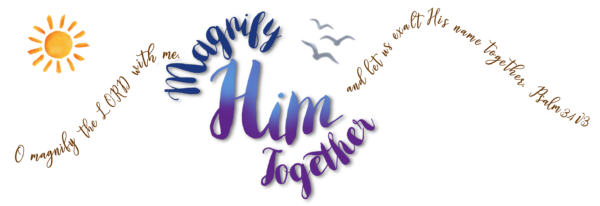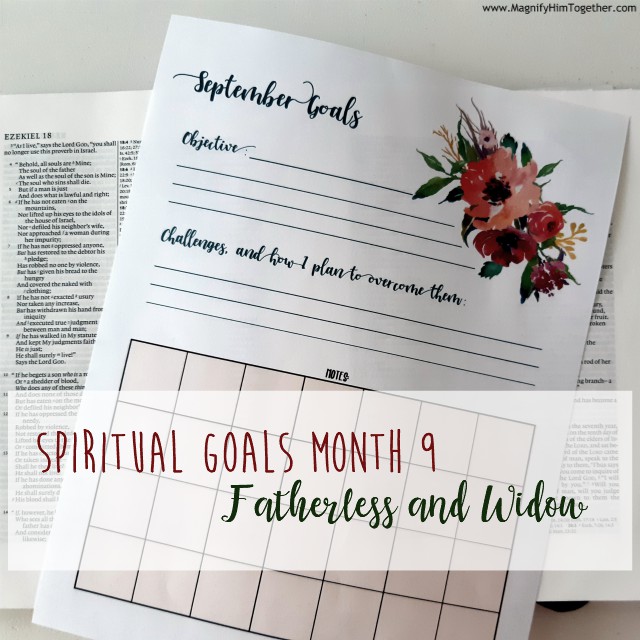We are now into month nine of our spiritual goals. This month we continue with our focus on relationships, in particular the fatherless and the widow. (Please see our outline of each of the monthly goals here: https://www.magnifyhimtogether.com/2018/12/31/spiritual-goals-journal-part-3-reaching-for-the-goal-of-the-prize-of-gods-high-calling/).
{We thank Sharon K. for the following article for this month}
“Religion that is pure and undefiled before God the Father is this: to visit the fatherless and widows in their affliction, and to keep oneself unstained from the world.” Ja 1:27
fatherless – from an unused root, ‘to be lonely’, orphan, a fatherless child
widow – desolate, without a husband
Why are we specifically to visit the fatherless and widows and not the motherless and widowers? In Lamentations 5:3, the Jews consider themselves to be “orphans and fatherless, our mothers are as widows”. They call themselves orphans while still having mothers. The reason seems to have to do with the role of a father in the Old Testament.
What was the role of a father in the OT?
In ancient Hebrew, the aleph is a picture of an ox head (![]() ) representing strength and power from the work performed by the animal. This pictograph also represents a chief or other leader. When two oxen are yoked together for pulling a wagon or plow, one is the older and more experienced one who leads the other. Within the clan, tribe or family the chief or father was seen as an elder who was yoked to others as a leader and teacher.
) representing strength and power from the work performed by the animal. This pictograph also represents a chief or other leader. When two oxen are yoked together for pulling a wagon or plow, one is the older and more experienced one who leads the other. Within the clan, tribe or family the chief or father was seen as an elder who was yoked to others as a leader and teacher.
The lamed ![]() is a shepherd staff and represents authority as well as a yoke. When combined these two pictographs mean “strong authority.” The chief or father is the “strong authority.”
is a shepherd staff and represents authority as well as a yoke. When combined these two pictographs mean “strong authority.” The chief or father is the “strong authority.”
https://www.ancient-hebrew.org/ancient-alphabet/aleph.htm
The aleph and lamed combine to form the name of God ‘EL’. We see then that the role of a father is to be a strong authority to his children, just as God is to all.
God describes himself in Ex 34:6-7 “merciful, gracious, slow to anger, abounding in steadfast love and faithfulness, keeping steadfast love for thousands, forgiving iniquity and transgression and sin, but will by no means clear the guilty.”
This perfect balance of mercy and judgment is something only God can achieve. And yet, God wants us to understand his character in the role of a father. Consider the following verses and how they contribute to the role of a father:
“As a father shows compassion to his children, so the LORD shows compassion to those who fear him.” Ps 103:13
“for the LORD reproves him whom he loves, as a father the son in whom he delights.” Pro 3:12
“Hear, ye children, the instruction of a father; and attend to know understanding.” Pro 4:1
“Wilt thou not from this time cry unto me, My father, thou art the guide of my youth?” Jer 3:4
A father instructs and reproves his children, he is a strong authority figure who offers both compassion and guidance.
From the world’s perspective, fatherlessness represents the following disadvantages:
-separation.
-violence.
-self-denigration and poor self-esteem.
-less achievement and social skills.
-a higher use of correctional facilities and personnel.
-a higher risk of chemical abuse.
-an economic and social disadvantage.
-a high rate of suicide.
-destructive lifestyles and identity confusion.
A fatherless child grows into a fatherless adult. Fatherlessness is not fixed by maturity, and is often not reversed by adoption or second families. There is no quick fix. Fatherless people are often broken people, who may behave badly for their whole life.
How is a widow disadvantaged by the loss of her husband?
The Bible emphasizes that widow is disadvantaged by the loss of an advocate. The father was not only to be a strong authority to his children, he was also to take part in serving justice to his community. We see this in Proverbs 31:
“Her husband is known in the gates when he sits among the elders of the land.” Pr 31:23
The city gate was used as a civil court and justice was decided by the elders. When a woman lost her husband, she lost an advocate for herself and her family. She was put into the lonely position of having no one on her side, while raising disadvantaged children. Jews were instructed to plead the cause of the widow.
“learn to do good; seek justice, correct oppression; bring justice to the fatherless, plead the widow’s cause.” Is 1:17
The precedent for care of the fatherless and widow is set in the Jewish law.
“You shall not mistreat any widow or fatherless child. If you do mistreat them, and they cry out to me, I will surely hear their cry, and my wrath will burn, and I will kill you with the sword, and your wives shall become widows and your children fatherless.” Ex 22:21-24
How were the fatherless and widows supported under the law?
- fatherless, widows & sojourners were permitted to “eat their fill” from the produce harvested and stored every three years (Deut. 14:29; 26:12-13)
- triennial tithing (Deut. 14:28; 26:12)
- that they were to be included in the rejoicing that was part and parcel of celebrating the festivals of Weeks (Deut. 16:11) and Booths (Deut. 16:14)
- that sheaves were left in the field after reaping (Deut. 24:19), olives left on the tree after beating (Deut. 24:20) and grapes left on the vine after gathering (Deut. 24:21) were not to be gathered, for they were reserved for consumption by orphans and others who were socially and economically vulnerable.
- Their judgment was not to be perverted, (Deut 24:17)
- They were to have a defense and be given justice, “Defend the poor and fatherless: do justice to the afflicted and needy.” (Ps 82:3)
- They are associated with the oppressed (Ps 10:18)
What does it mean, the “oppressed”?
‘Oppressed” = ‘dak’ “crushed, dejected, afflicted”. The biblical word (dak), refers to something thin as in the “thin, small voice” heard by Elijah (I Kings 19:12). It also means to pulverize; the recipe for the sacrificial incense requires one to “beat some of it into powder [hadek]” (Exodus 30:36). https://www.thejc.com/judaism/jewish-words/bediyuk-1.5784
“The sacrifices of God are a broken spirit: a broken and a contrite (dakah) heart, O God, thou wilt not despise.” Ps 51:17
We could read Ps 10:18 as ‘to do justice to the lonely and dejected, so that man who is of the earth may strike terror no more’. The lonely and the dejected are vulnerable because they are powerless. When there is an imbalance of power, there is often injustice as a result.
How can we support the fatherless and widow?
There are many charities in place that support the financial needs of the fatherless and widow around the world. There are homes where the fatherless can be part of a family, and widows can have the friendship with other widows. Please consider contributing to the work of:
Agape in Action https://www.agapeinaction.com/aboutus
Christadelphian Meal a Day Fund http://www.meal-a-day.org/
Christadelphian Outreach Group http://christadelphianoutreachgroup.blogspot.com/
We may need to give more careful thought to the disadvantaged in our communities and ecclesias. How do we identify the fatherless in our communities? The disadvantages of fatherlessness may include; children whose father is dead, has abandoned the family, has serious addictions, and abusive fathers.
How do we identify widows in our communities? The disadvantages of widows extend to; women whose husbands have died, have abandoned the family, have serious addictions and husbands that are abusive.
In the case of a dead father or husband, the need is evident. However, when fatherlessness/widow presents as a condition of abuse, addiction or illness, there may be an effort to disguise the situation. In the parable of the sheep and the goats, Jesus criticizes the goats for not recognizing need when it was present. We need to be discerning, and compassionate.
How can we balance mercy and judgment for the fatherless ?
How can we become advocates for the widow?
How does this relate to the godless of our world?
“remember that you were at that time separated from Christ, alienated from the commonwealth of Israel and strangers to the covenants of promise, having no hope and without God in the world.” Ep 2:12
As Gentiles, we were fatherless and widows before baptism. Gentiles surround us who are still in this position. Consider this verse for Gentiles without hope and without God in the world.
“For he will deliver the needy when he cries for help. The afflicted also, and him who has no helper” Ps 72:12
The word for helper is so interesting. The Septuagint translates ‘azar’ most often with the word group that includes boáo, boetheo, boethos, all conveying the general idea of ‘running to the aid of one who cries out for help’. Azar is used mockingly of the inability of idols or pagan gods to aid their people (Deut 32:38). It describes people helping each other to accomplish goals (Josh 1:14, 10:4).
The following is commentary by Charles Spurgeon, he says it so beautifully,
“For he shall deliver the needy. Here is an excellent reason for man’s submission to the Lord; it is not because they dread his overwhelming power, but because they are won over by his just rule. Who would not fear so good a Lord, who makes the needy his peculiar care, and pledges himself to be their deliverer in times of need?
When he crieth. He permits them to be so needy as to be driven to cry bitterly for help, but then he hears them, and comes to their aid. A child’s cry touches a father’s heart, and our God is the Father of his people. If we can do no more than cry it will bring omnipotence to our aid. A cry is the native language of a spiritually needy soul; it has done with fine phrases and long orations, and it takes to sobs and moans; and so, indeed, it grasps the most potent of all weapons, for heaven always yields to such artillery.”
How does this relate to those without Christ?
Gentiles separated from Christ are without an advocate.
“But if anyone does sin, we have an advocate with the Father, Jesus Christ the righteous.” 1 John 2:1
If our sins are not forgiven, they are held against us like the widow of Rev 18:4-5, “Come out of her, my people, lest you take part in her sins, lest you share in her plagues; for her sins are heaped high as heaven, and God has remembered her iniquities.”
When we think of the balance of mercy and judgment we should have for those without Christ, we can think of the mercy of Abraham when he was told that Sodom would be destroyed. He pleaded to God for the city. “Wilt thou also destroy the righteous with the wicked?” Gen 18:23 Also the judgment of Lot, “I beg you, my brothers, do not act so wickedly.” Gen 19:7
True religion is to ‘visit the fatherless and the widow in their affliction,’ but there is an important warning also, in all our helping, we must keep “unstained from the world”.
Here is the monthly journal page, to keep track your goals:

Monthly Discipline Journal Page August
Also don’t forget to print off a monthly attribute page to think through an attribute (or spiritual fruit) that you would like to focus on this month!


